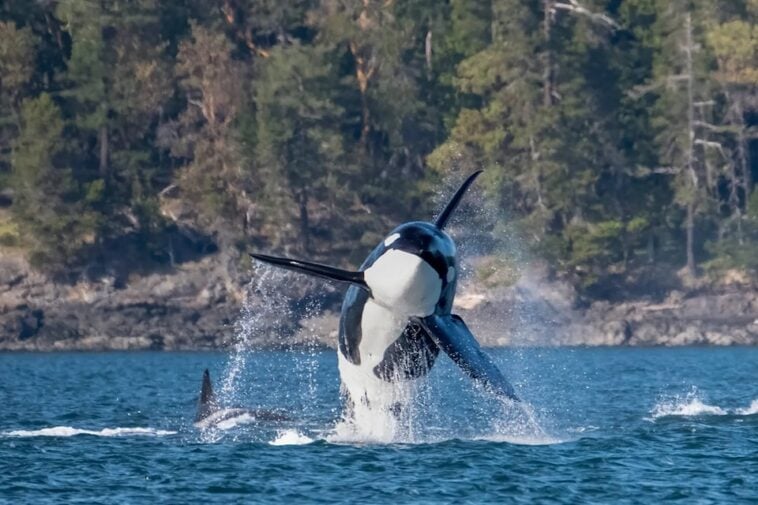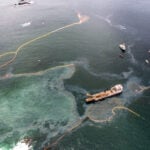Emergency protections for endangered southern resident killer whales are urgently needed because of increased oil tanker traffic from the expanded Trans Mountain (TMX) pipeline, says a coalition of conservation groups.
“Conservationists petitioned the federal government for an emergency order to protect the last of BC’s endangered southern resident killer whales. They say an order under the Species at Risk Act would help save the orcas from oil tanker noise, pollution, threat of vessel strikes and risks to food and habitat.”
~~~
Six environmental organizations are formally petitioning Environment Minister Steven Guilbeault and Fisheries and Oceans Minister Diane Lebouthillier, urging them to recommend that cabinet issue an emergency order under the Species at Risk Act (SARA) to save the remaining 74 whales, said Margot Venton, nature program director of Ecojustice, a legal charity working for the environmental groups.
An order is the best tool at Ottawa’s disposal to urgently tackle the rising underwater noise, toxic water pollution, threat of vessel strikes and risks to critical habitat and food sources that shipping traffic poses to the whales, which are already on the cusp of extinction, said Venton.
Southern residents, dependent on dwindling Chinook salmon for food, are expected to face a seven-fold increase in TMX tanker traffic through their critical habitat in the Salish Sea when the expanded pipeline reaches peak capacity this summer.
The din of underwater noise from both large and small boats significantly impairs southern resident killer whales’ ability to communicate with one another, hunt for salmon and reproduce, noted the environmental groups, which include the David Suzuki Foundation, World Wildlife Fund Canada, Raincoast Conservation Foundation, Georgia Strait Alliance, Living Oceans Society and Natural Resources Defense Council.
Southern resident killer whales use echolocation, or the production of sounds that bounce or reflect back to the orcas, which use the information to “sense” each other, prey and surroundings. Studies show the endangered whales can lose more than half of their echolocation range near commercial shipping traffic lanes.
In busy shipping hot spots such as Swiftsure Bank, off southwest Vancouver Island near Port Renfrew, this interference in the whales’ foraging ability can occur for up to 70 per cent of the time the whales frequent these areas.
After approving the TMX project despite the compounded risks for southern residents, Ottawa promised to meet 16 recommendations from the Canada Energy Regulator to “more than mitigate” the additional noise pollution, risks of oil spills, and water and air pollutants from oil tankers before they hit the water, Venton said.
A key concern is Ottawa’s failure to meet the core recommendation to assess and come up with a strategy to address the cumulative impacts on the health of the Salish Sea, which include short-, medium- and long-term targets for reducing noise pollution and other threats to the whales and other marine species, Venton stressed.
This is the second time this decade conservation groups have urged the federal government to take emergency measures to protect the endangered whales , said Jeffery Young, senior science and policy analyst at the David Suzuki Foundation. At the time, Ottawa argued a comprehensive strategy was necessary.
Over the past six years, the federal government and the Port of Vancouver have implemented a mix of voluntary and mandatory measures to better protect the endangered whales, which include some fishing area closures, slow-down zones and sanctuary areas for the whales. However, there’s little measurable evidence of improvement to the health of the whales, said Young.
More dramatic measures are needed to ensure the whales’ recovery, he said, given research shows a continued downward slide to extinction is occurring as Southern residents fight for survival in increasingly busy, noisy, polluted waters.
The conservation groups are urging the federal government to act quickly to take a number of measures to quiet the waters in the areas where southern residents hunt for food, Young said.
Ottawa should immediately increase the minimum distances for recreational and whale-watching vessels for southern resident killer whales up from 400 to 1,000 metres to align with new rules being rolled out by Washington State in 2025.
Supertankers serving the TMX terminal should also be required to obtain and meet certain noise classifications issued by recognized marine organizations. And Ottawa needs to urgently adopt and implement mandatory underwater noise reduction targets, stressed Venton.
“We’re not actually asking the question, `How quiet does the ocean need to be for this marine species to carry out their basic life processes?”’
Margot Venton, nature program director of Ecojustice
The Port of Vancouver’s ECHO Program — which involves numerous conservation, industry, research, and private sector groups working to voluntarily reduce the impacts of marine traffic — has had some success, acknowledged Venton.
Slowdowns or distancing measures by nearly 90 per cent of large vessel operators in port authority areas critical to southern resident killer whales dropped underwater noise by half, reduced the danger of ship strikes by a third and lowered emissions, according to the Vancouver Fraser Port Authority.
However, reducing noise pollution alone is not enough, she said. A noise threshold or reduction target needs to be set low enough to effect the whales’ recovery and should be paired with other critical measures, she said.
“We’re not actually asking the question, `How quiet does the ocean need to be for this marine species to carry out their basic life processes?”’
Additionally, DFO’s Chinook fisheries closures to date have been ineffective, Young said. While some areas have been closed seasonally to fishing activity in some critical habitat areas, these areas are too small and limited. Additionally, the area closures haven’t been paired with reductions in the overall catch volume of the endangered Chinook Salmon stocks, but simply shifted where the fish are caught, he said.
“We haven’t done enough to ensure the catch levels are kept low enough,” Young said.
Not only does it continue to threaten the whales’ food supply, but it doesn’t allow enough Chinook to escape up the Fraser River to spawn and recover, particularly as drought compounds the threat to fish stocks.
“As these TMX tankers begin to sail and before Terminal 2 gets built, we have a pretty short window to try and get to a place where we can give the whales a chance.”
Margot Venton, nature program director of Ecojustice
Until the federal government can craft and implement it’s overdue cumulative management plan to address shipping impacts, it needs to curb projects that entail dramatic increases in traffic, such as the Roberts Bank Terminal 2 expansion .125RBT2.375 that is posed to double the capacity of the Port of Vancouver and the Westshore facility, near Delta, by the middle of the coming decade, he said.
Emergency measures under a protection order can boost recovery of the southern resident population in the interim, until a more comprehensive protection plan for the Salish Sea can be rolled out, Young said.
“As these TMX tankers begin to sail and before Terminal 2 gets built, we have a pretty short window to try and get to a place where we can give the whales a chance.”
Interview requests and questions on protection measures for southern resident killer whales by Canada’s National Observer to the ministries of Oceans and Fisheries, Environment and Climate Change Canada, and Transport Canada received no response by publication.
Rochelle Baker / Local Journalism Initiative Reporter / CANADA’S NATIONAL OBSERVER





